After his house was forcibly evacuated in April 2017, and demolished three months later, Abu-Mahmoud, 45, died of a brain stroke, after having to forsake his stable life at his home at the Khalaf al-Razi district in Damascus.
Abu-Mahmoud used to own 4 houses in the neighborhood, in which he lived with his sons, before three of them left Syria because of war, while Abu-Mahmoud remained there with his daughter.
The evacuation of Abu-Mahmoud’s house was executed under “Decree 66” that aimed to construct an integrated urban area. Although the decree had been passed 7 years ago, Abu-Mahmoud’s sons didn’t receive alternative housing. The decree stipulates providing “alternative housing” in 4 years from its issuance in 2012, but the property of Abu-Mahmoud’s sons was confiscated; as they were abroad and could not prove the house ownership upon evacuation.
Abou Mahmoud’s family and another 150 thousand residents in Mazzeh and Kafr Soussa are homeless until now, waiting for the “alternative housing”, while most departed families did not receive proper leases or compensation to secure a shelter during the determined period for executing the decree.
The issue became more complicated when Damascus Governorate required high prices for delivering “alternative housing” which is not yet available, while evicted families are going through difficult economic conditions, which makes it impossible for them to pay such high prices, according to this report.
Over 6 months, the report reveals that Damascus Governorate violates some clauses of “Decree 66”, most significantly is the non-commitment to the determined term set to provide residents the “alternative housing”, for high prices, in addition to the low, insufficient and late lease allowance that should have been given to evicted families to secure a residence until they can receive their alternative houses from the governorate.
An alternative housing is a house a resident receives instead of their informal one located in the area stated in the decree. Alternative housing should have been available within 4 years of the issuance of the decree, but the related paragraph in Law no. 10 has been amended to stipulate delivering the alternative housing after 4 years from evacuating the house.
Regulatory instructions for alternative housing for entitled beneficiaries were issued only in 2015 (three years after the decree was issued), in decree no. 112 issued by the Minister of Housing, which left the alternative housing entitled beneficiaries homeless during all this time.
Also the residents that were absent during evaluating the neighborhood houses have lost their entitlements and couldn’t register their houses to receive lease allowances and alternative housing. This was confirmed by Gomaa Al-Hallaq, law expert, and 3 other residents.
No Ownership Rights
“Four eviction notices (one notice for each house) were issued, Damascus Governorate has checked my family’s house in the presence of my father, and was aware the house is inhabited. When the second check was to be conducted, my father and brother were visiting Turkey, but my sister was there in the house, the check committee photographed the house, but labeled it in papers as “closed house”, meaning they didn’t acknowledge our ownership of the house” says Mahmoud, Abu Mahmoud’s elder son who lives in Turkey, describing what happened as “uprooting out of the district”.
Four Eviction Notices (exclusive)
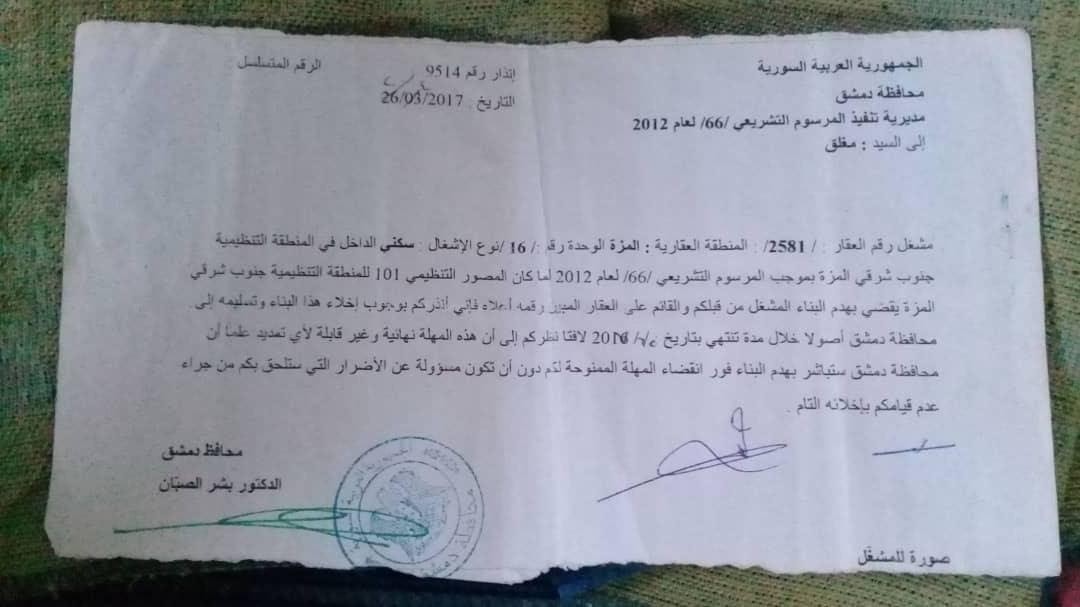
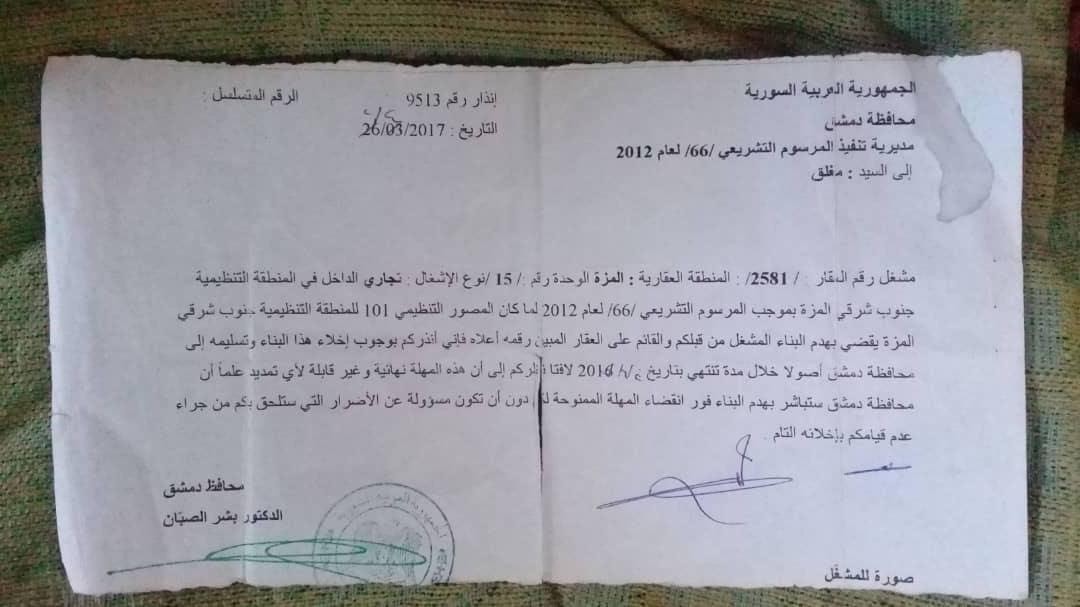
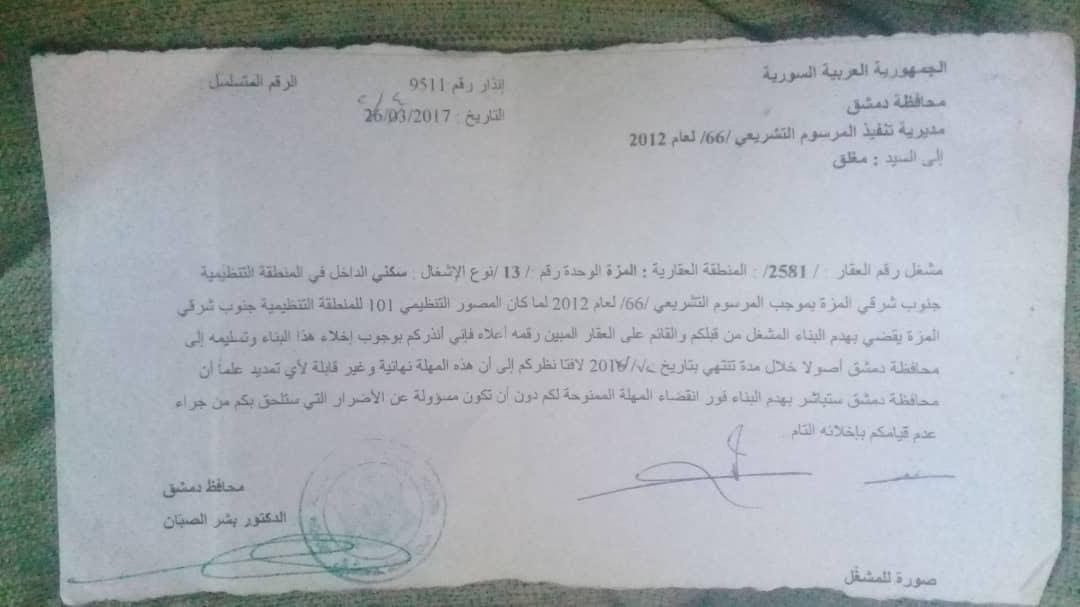
“We notified property owners of the checking and registration processes. 8200 people have declared their entitlement. We, in cooperation with honest and just judges, have matched the entitlements with real estate’s authorities, and it resulted in registering the properties of 5500 people, while ownership could not be proven for the other 2700,” said Jamal Al-Youssef, Decree 66 former enforcer.
Verifying the non-entitlement of those people, Ghaleb Eniz, member of Damascus Governorate Council, says “Damascus Governorate, when Governor Beshr Al-Sabban was in position, instructed properties owners, who sought to register their possession, to submit a travel/ departure statement to confirm their presence in the country, in order to ban those citizens abroad from registering their properties and consequently not proving their ownership of houses inside the integrated urban area, knowing that this procedure is not stated in decree no. 112 issued by the Ministry of Housing and Urban Development, yet it was attached to Decree 66 to regulate providing the alternative housing. Therefore, around 2700 families were deprived of alternative housing; most of them were out of the state and could not submit the required statement proving their presence in the country”.
Decision 112 (exclusive)
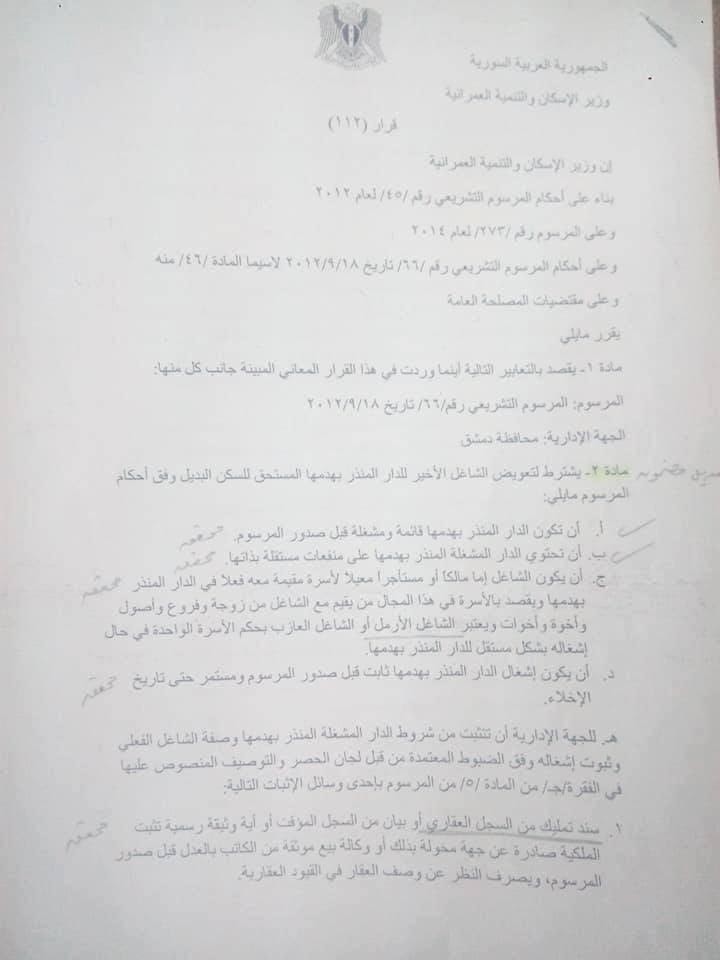
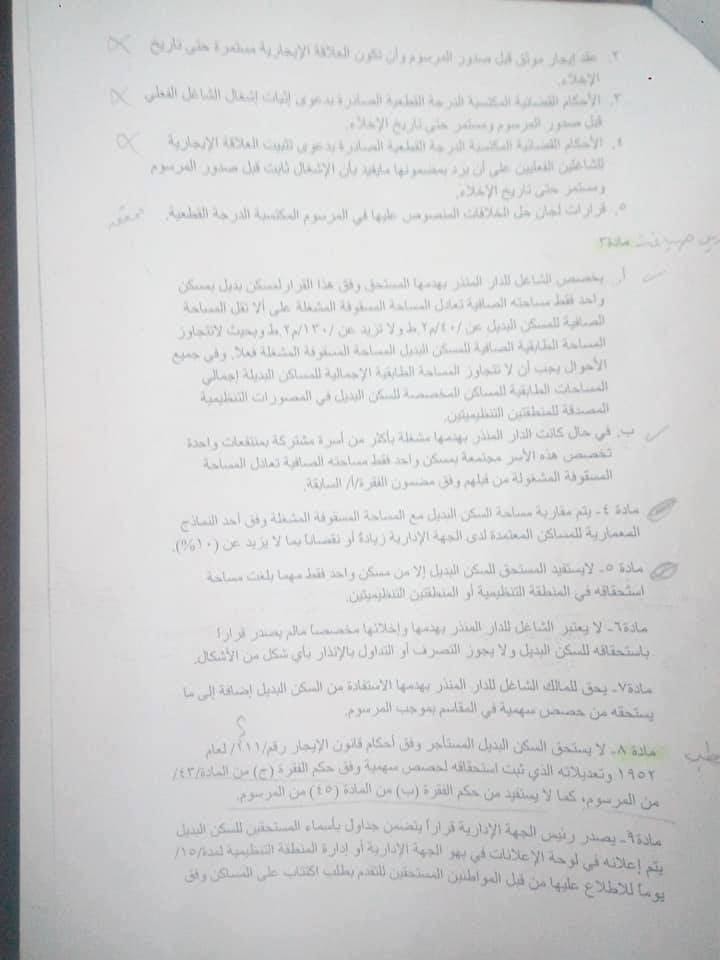
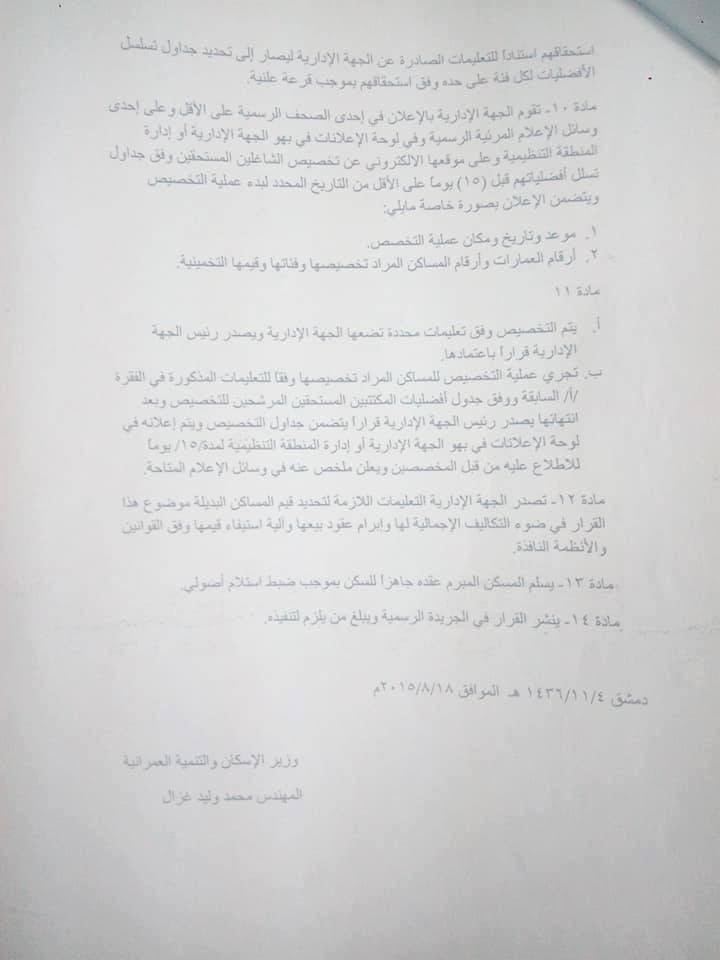
Clause “D” of the decision states that “alternative housing beneficiary shall submit proved entitlement of their house over the period from the decree issuance date until evacuation date” but didn’t refer to people who are out of the country.
Eniz noted that some cases were registered as closed houses (not possessed), although owners were present inside Syria, but when conducting the checking process, they were not present, for any reason. When appeals were allowed, only 100 people out of two thousand objectors were registered entitled.
Jamal Al-Youssef, former enforcer of Decree 66, verifies the late conduction due to “the State’s conditions”; as work was not allowed upon issuing the decree. When it was allowed to enter Khalaf Al-Razi district in 2013, work commenced.
According to Jamal Al-Youssef, the number of alternative housing entitlements reached 5500 out of 6500 citizens who applied, indicating that 1000 citizens were deprived from the alternative housing.
“We announced receiving appeals, 550 objectors applied, and a committee was formed to discover the lack of some documents like a proof of the citizen’s presence inside the country and citizen’s compliance to army reserve admission. Out of 550 appeals, only 119 were examined after submitting the required documents that prove alternative housing entitlement” said Al-Youssef.
Alternative Housing or Expropriation?
Although more than 3 years have passed, Abu-Yasser and his 5 children, who evicted their home at Khalaf al-Razi region, on May 16, 2015, are still waiting for the alternative housing Abu-Yasser had to sell more than half his shares in the project, about 37 million Syrian liras (worth 37’000 USD) in Marsoum region, to buy a house in Reef Dimashq, because the “rent allowance” which is given to him by the Damascus governorate.
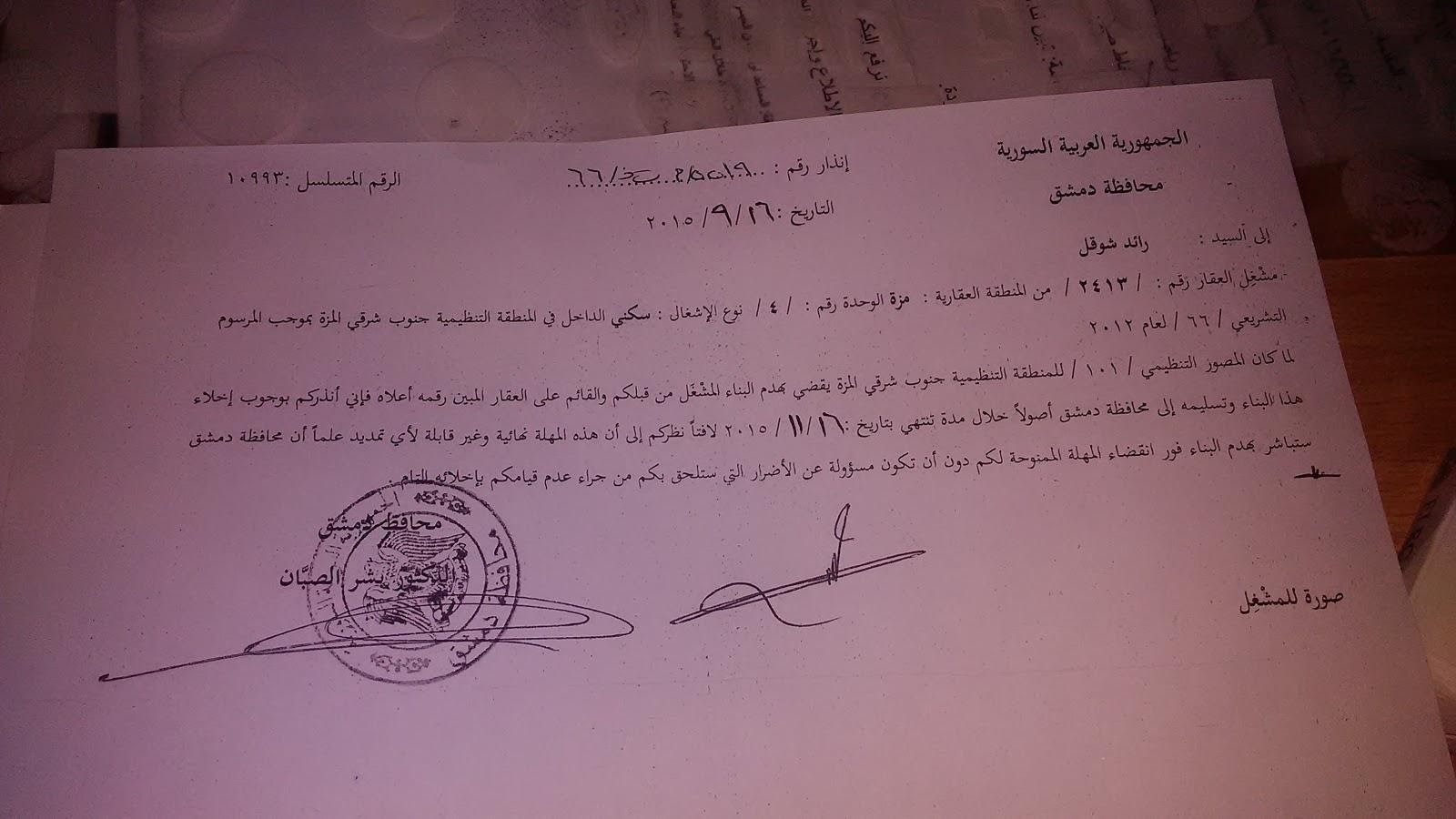
Abu-Yasser says, “I couldn’t adapt to life in the countryside, I couldn’t move my factory from Khalaf al-Razi region to the new place I live in, due to the fast eviction, which left me unemployed”.
Abu-Yasser described what happened as expropriation, as he was forced to sell more than half his shares in the project, move to Reef Dimashq and lose his source of income. He explained that Damascus governorate “cut off the power and water supply in his region, to force people to move out”.
Abu-Yasser received the first rent allowance in November 2018 (2 years after they were evicted) and the second time was 5 months later. “Had I been a tenant, I and my family would have been homeless, due to the delay of the rent allowance cheques”. His rent allowance was estimated by 652’000 liras per year (about 650 USD), while he has not yet received the third rent allowance due to the delay that happened.
Rent allowance is paid every year in the form of monthly bills of 50’000 liras each. Rents in Damascus start from 100’000 liras, according to a broker in the city.
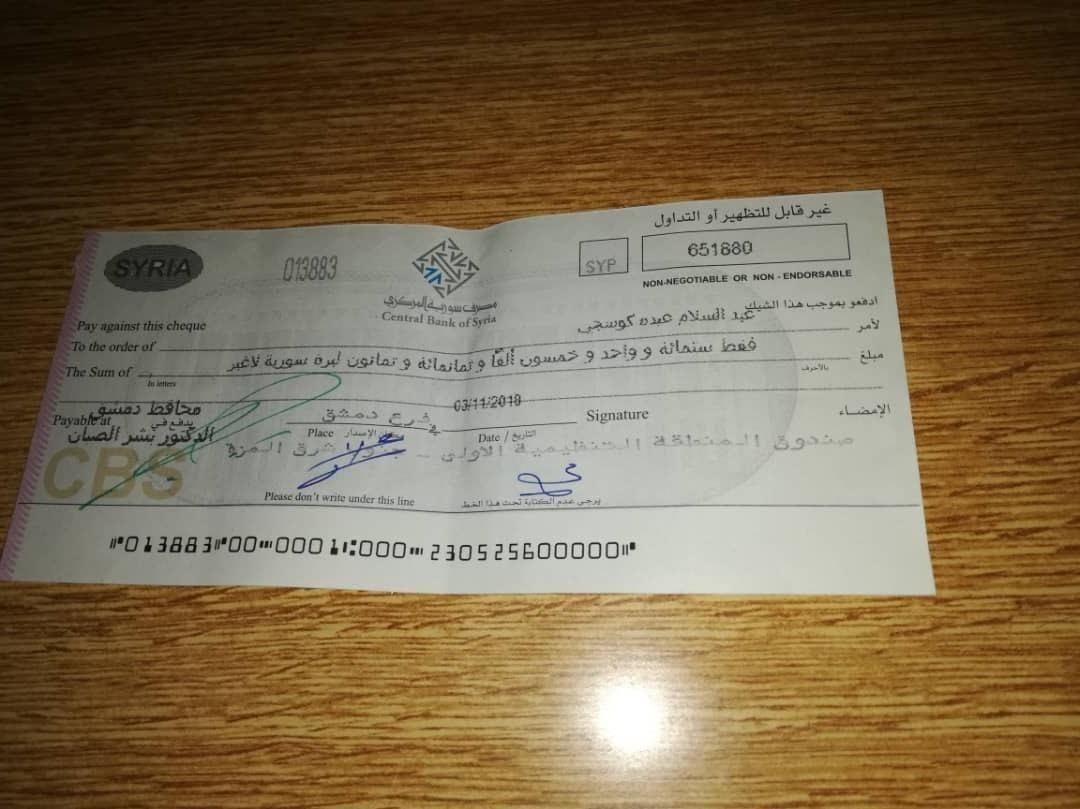
Changing Housing Locations
Damascus governorate changed alternative housing location from the first organizational area (Maruta City) to the second, (Basilia City), according to the statement of Bilal Na’al, board member of “Damascus Holding” which participates in the project, during the ordinary session of Damascus municipality on October 11, 2019, which means residence will be moved from an economically active region to a place far from the city center.
Legal expert Jum’a Hallaq said, “The organizational plan was changed more than once, although the alternative housing buildings should be within the first area (Maruta City), according to decree no. 66, articles 19 and 20”. So the alternative housing will not be delivered until the second (Basilia City), which is not yet ready, is finished. Until now, the organizational plans have not been set, and the inhabitants of the area have not been evicted, which means delivering alternative housing units will further be delayed.
Estimation Committees Waste Owners’ Rights
Article 7 of the decree no. 66 states that committees of legal experts and real estate experts are to be formed to estimate the value of the rent allowance and the areas of the ‘prospect’ alternative housing units.
The committee consists of a judge, appointed by the Minister of Justice, who acts as the head of the committee, two real estate evaluation experts, appointed by the Minister of Housing and Urban Development, in addition to two experts who represent the owners”.
But these committees failed to evaluate many properties accurately, and wasted the owners’ rights, according to the statements of some owners who think their properties were “underestimated”.
Fahd, 30 years, was one of the residents of Khalaf al-Razi, said, “The committee measured the area of his house, but changed its description, like the type of bricks and marble, thus depreciating its value. When he objected, the architect in charge said, “All is the same to us”.
Ghalib Onayz thinks that the committees that carry out the evaluation and documentation are not infallible, they have made mistakes that have not been corrected. Evaluation and description records were not published, as in case they were published citizens would be able to object to them and demand his rights.
Reporters tried to know the reason why the evaluation and description records were not published, through asking the directorate responsible for executing decree 66, which keeps the records, but a source in the directorate refused to comment.
The bigger problem was when the Damascus governorate employees registered Um-Khaled’s house in the name of another woman, who has nothing to do with the house.
Um-Khaled said, “It is my property, but I had hosted one of my friends who was displaced from Jobar and when the employee came from the governorate, his name was Mudar, he asked my friend: Who are you? She said: A guest from Jobar. Yet he took her ID and her husband’s ID, and registered their data, and later it turned out that my own house was registered in my friend’s name in front of my eyes”.
Um-Khaled filed a complaint, but to no avail, because the reassessment process needs a court order, as the responsible committee is judicial, which makes the correction difficult. She said, “I lost my house in a moment due to this injustice”.
Jamal al-Yusuf, the director of execution of decree no. 66, replied that “the committees did not commit any mistakes, and those who complained could not produce any authentic document to prove their claims,” adding that “the work is done through an automated institutional mentality”.
Incorrect evictions
The unpleasant surprise for Hala (56 years) and her family was when they got evicted from their 3 storey home on March 27, 2017.
She said that security elements summoned her and told her that they should evict their home within 15 days, although other home owners had received notice months before her without executing the eviction. She saw the eviction executed equally to all the residents of the region.
Hala had to evict her home and could not even sell all her furniture, because whe was forced to evict within 15 days without prior notice.
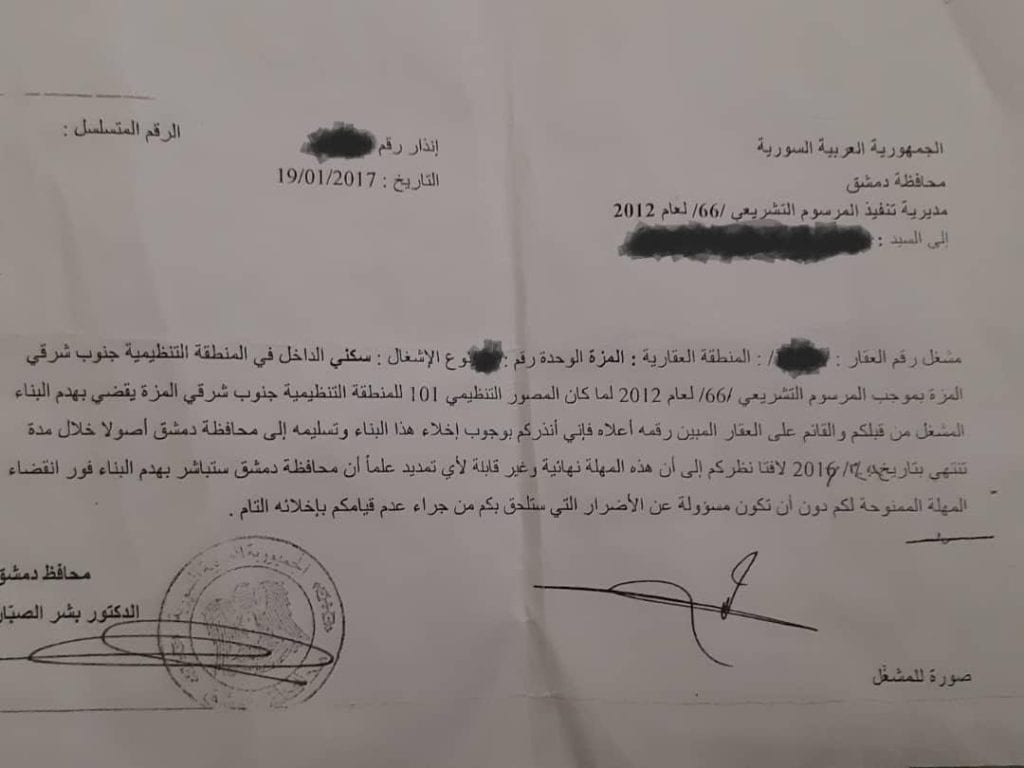
Six other residents of the same area narrated stories similar to Hala’s, they said evictions were not implemented correctly, and that there was violence and ill-treatment of civilians.
Legal expert Jum’a Hallaq explained that Damascus governorate totally evicted the area of Khalaf al-Razi in 2017, in a clear violation to article 40 of the decree, which states: “Damascus governorate shall be responsible for delivering the land of the divisions empty to the owners within a maximum of 90 days from the date they obtained the construction permits, as the governorate has evicted the area before issuing the permits.” This means that issuing construction permits should take place before the eviction process.
By searching the governorate’s archives, reporters discovered that the first eviction notice was issued in September 2015, while the first construction permit was issued in 2019.
Hala narrated the stories of some of the residents of the area who were evicted during the school year, which resulted in interrupting the educational process for most of the region’s children.
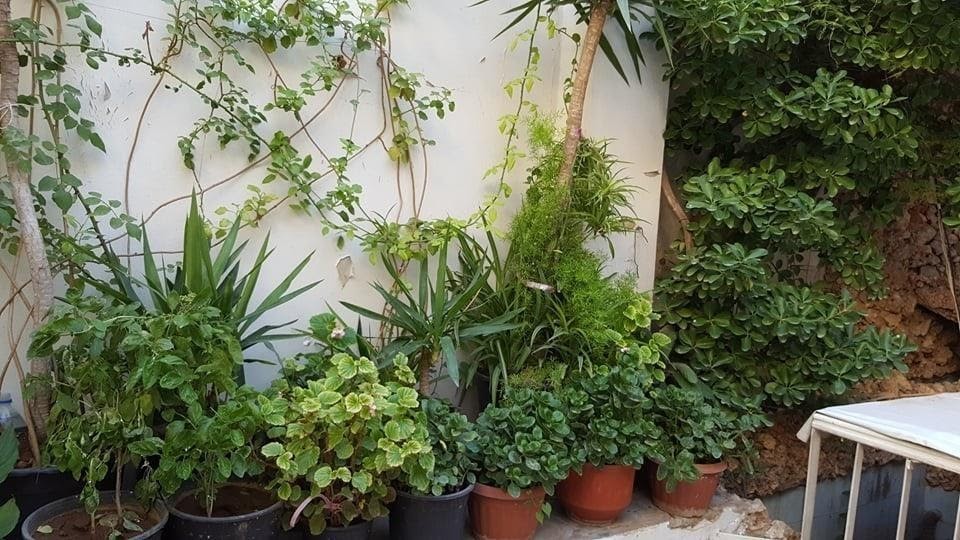
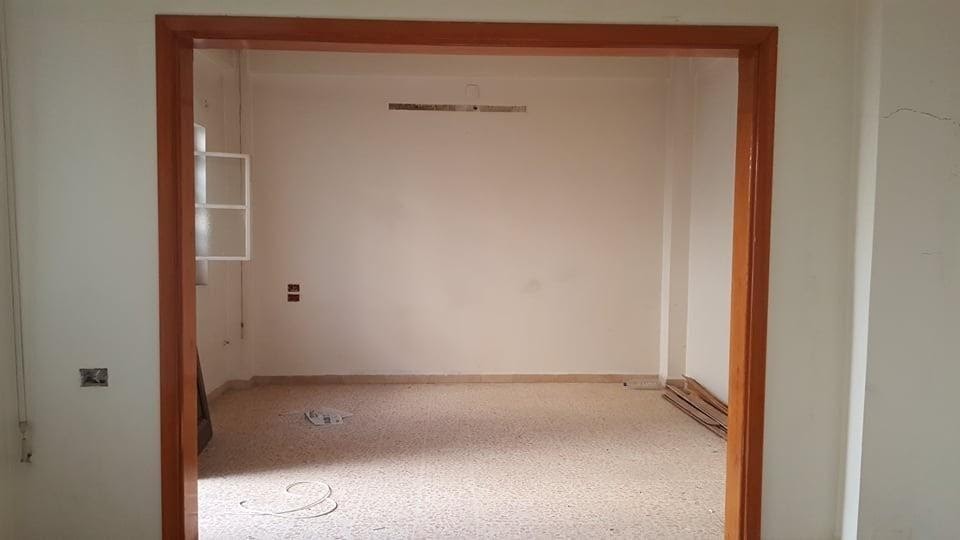
Within one week Fahd was evicted from his home, in Khalaf al-Razi, with his furniture, so he had to stay homeless for two months, looking for a place for his family to stay.
Fahd said, “I was living on my own property which I had built on my father’s land. It was 90 square meters, and I didn’t have to pay rent. Now I’m living in a single room in an old house in Sheikh Sa’d district, with 5 members of my family”.
However, despite this suffering, Fahd still hopes to receive alternative housing―even after a while―because his house’s area is 90 square meters, and the roofed area in his house is less than 40 square meters. Hence, he does not get a separate house in the new project, according to article no. 3 of resolution 112. And if more than one family lives in the apartment, it gets a new one with the same exact area of the old house.
The legal expert, Jomaa Al Hallaq, believes that this article prompted the public to sell their shares, to be able to carry on. Explaining that these people won’t be able to buy anything in the Decree stated area.
Alternative Housing that is Beyond its Residents’ Affordability
According to Article 45 of Decree 66, the duration set for providing alternative housing was four years after the decree was issued in 2012, which means that alternative housing is supposed to be ready by the year 2016.
But when Damascus failed to secure alternative housing during such a period, the well-known “Law No.10” stated in article no. 25 that the period of alternative housing delivery is four years from the date of home evacuation, instead of 4 years from the date of the issuance of Decree 66.
Taking into consideration the presence of owners who evacuated their homes in 2015, the amendment that was stipulated in Law No. 10 was also not complied with, as they evacuated their homes 5 years ago, and were supposed to have received their alternative apartments within 2019.
Jamal Al Youssef estimates the square meter’s price of an apartment in the alternative housing project, between 270 and 300 thousand SYP (300 USD) as a real cost for construction only, excluding the value of land, street & lighting expenses. Where payments are supposed to be made in installments over the span of 25 years, with interest rate of 10%, provided that the first installment payment should be covering 10% of the property’s value according to resolution 112.
Mr. Al Youssef considers this fair, “As those living in illegal or informal buildings, weren’t paying any fees or taxes, and the state was offering them free services, that’s why it is time for things to change.”
He believes that citizens benefited from the project, once the entitlement of the alternative housing is allocated, they can sell it and gain profits, while he urged those who cannot pay for alternative housing, to “find a way” either by making a good use of their resources and assets, or by taking loans, noting that Damascus cannot issue a law that suits everyone’s circumstances.
In economic terms, 30 million SYP―about 30,000 USD―is the price of a 100-square-meter home, in addition to 10% interest. Hence, the price becomes 33.5 million SYP. A price that those entitled to alternative housing can’t manage to afford, which Ghalib Unaiz considers a way “that opens the door in front of the major real estate traders.”
Futile Rental Allowances
Article 44, Decree 66, stipulates that those who aren’t entitled to alternative housing be granted rental compensation for two years. In addition to compensating those who are entitled to alternative housing, with an annual rent until they receive their housing, and the payment is to be made within one month from the date of notification of the evacuation notice.
Today, Hala pays a rent of 125,000 SYP for a home made up of two small rooms in Damascus, while her house rent allowance was estimated at 750,000 SYP. She said that: “This rental allowance doesn’t cover half of what I pay, especially given the high rent prices, and the difficulty of finding a house to rent due to the high demand in some regions,” the thing that forced her to sell part of her shares in the regulated area to cover her rental expenses.
On the other hand, Fahd pays 75,000 SYP per month for one room with no utilities, and his rent allowance is not enough. “However, Damascus is still late in paying rent allowances and doesn’t give us the money on its due date.” He said.
“The poor value of the rental allowance prompted the public to sell their shares in the project, and to date, the rental allowance isn’t paid on time in addition to the postponement of the date of demolition related to the payment of the rental allowance.” Jomaa Al Hallaq said.
However those who aren’t entitled to alternative housing are about 2500 families out of almost 8500. These families are granted a rental allowance for two years only from the date of evacuation while their fate remains unknown after that period.
Ghalib Unaiz, a member of Damascus Governorate Council, Ghalib Eneiz, believes it’s “Unfair to these families,” and says: “2,500 families used to be stable and live peacefully, and now they became homeless.” Moreover, he explained: “The state is obligated, under the constitution, to provide housing for its citizens.”
Um Muhammad has been living for about 50 years in Khalaf Al Razi (Old Rent), she couldn’t prove that she’s a renter because she didn’t have the old tenancy agreement which led to depriving her of alternative housing and rent allowance. Although she objected to the Decree 66 Implementation Directorate three times, she did not get any help, and the Directorate’s staff informed her that it’s all her fault and she must return to the court to object.
Despite the fact that renters, who don’t own lands and have been living in the region before the year 2000, get 30% of the residential real estate shares and 40% of the commercial real estate shares, according to article no. (44) of Decree no. (66).
Jamal Al Youssef considers the rent allowance a “state contribution” to help citizens rent a house until alternative housing is ready, and admits that there’s been a delay in paying the entitlement of the alternative housing―because of the “general situation”―adding that the governorate paid almost 8 billion SYP in compensation for the rent allowance.
Mr. Al Youssef confirms that the rent allowance is not enough, and many objections were registered against it, but the specification of the rental allowance was conducted by judicial committees and issued with a final judicial decision. It can only be amended by amending the law, the thing that requires another judicial decision.
Mr. Al Youssef expects that the alternative housing will be ready within a year and a half from now. “We cannot continue to pay rent allowances, it’s a heavy burden for us” He said.
A Stumbled Beginning for Reconstruction
Decree no. (66) and its implementation gaps represented a ‘stumbled beginning’ for the reconstruction of Syria, which became an international media sensation. And despite the passage of 8 years since the decree was issued, no actual reconstruction operation has been carried out so far. While the residents of the area mentioned in the decree have remained homeless since their evacuation.
The project consists of two regulated areas, the first “Marota City”―which means (sovereignty) in Aramaic―and the second “Basilia City”, which means (Paradise). Marota City covers an area of 2 million and 149 thousand square meters in Khalaf Al Razi region, it will include 12,000 apartments distributed among 168 towers, ranging between 11 and 22 floors each. While Basilia City covers an area of 9 million square meters on the southern ring-road between al-Qadam and Yarmouk Camp. It will include 4,000 apartments, according to the data provided by the companies participating in the implementation of the regulated area.
Both, Marota and Basilia, were presented as Syria’s first “three dimensional” smart cities with luxurious infrastructures, automated services, online traffic control, educational, cultural, entertainment and tourism centers, to attract investors to Syria and create a new “Dubai” in Damascus.
However, this luxury didn’t do Mahmoud any good when his father died due to being forced to evacuate the house, and he lost his right to its ownership. Moreover, such luxury meant nothing to hundreds of families who were displaced from their homes, without having anything to rely on but rental allowances that are not sufficient to rent a small room in Damascus. They were left waiting for an open date for their return to their new houses.
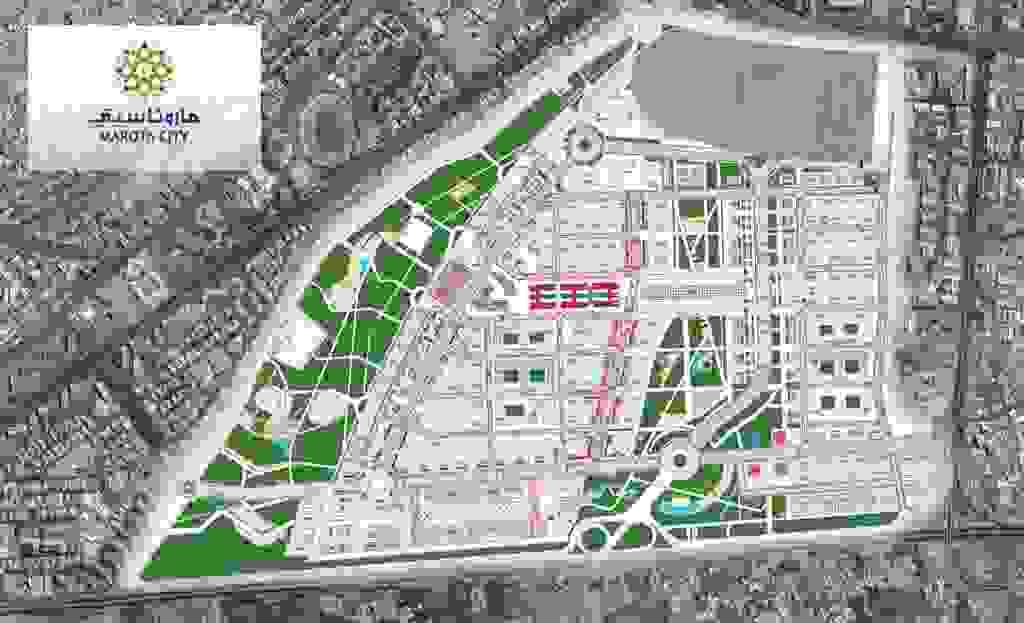
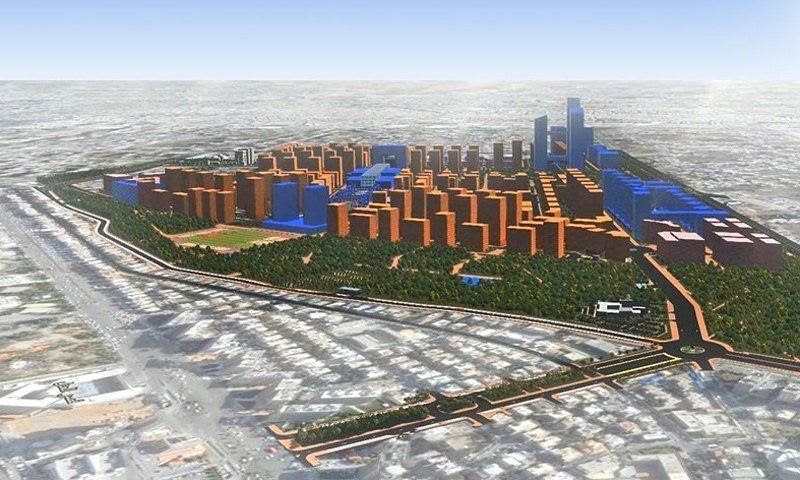
The Syrian Investigative Reporting for Accountability Journalism (SIRAJ)




